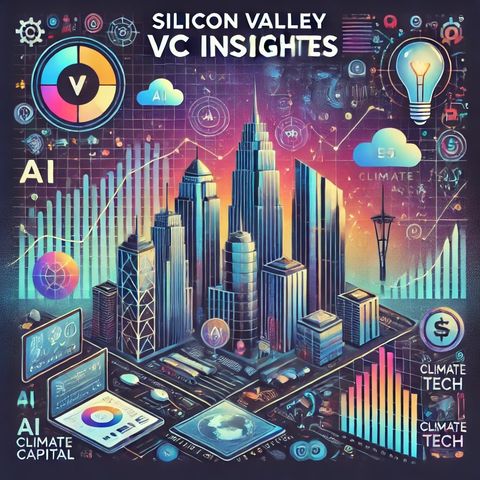Silicon Valley Venture Firms Pivot to Climate Tech, Fusion, and Global Expansion Amid Economic Shifts

Descarga y escucha en cualquier lugar
Descarga tus episodios favoritos y disfrútalos, ¡dondequiera que estés! Regístrate o inicia sesión ahora para acceder a la escucha sin conexión.
Descripción
In recent days, Silicon Valley venture capital firms have been navigating a complex landscape of economic challenges, regulatory changes, and shifting investment trends. One of the most notable developments is...
mostra másGeneral Catalyst, a prominent Silicon Valley venture capital firm, has made its first investment in Saudi Arabia, highlighting the global expansion of venture capital activities. This move is part of a broader trend where Saudi Arabia's fintech startups have raised over $1.84 billion in venture capital since 2018[3].
In the realm of climate tech, particularly fusion energy, significant investments have been made. Mark Coopersmith, a Silicon Valley-based venture capitalist and UC-Berkeley professor, notes that despite the long-term nature of fusion technology, big bets are being placed due to the potential for massive returns. Notable deals include $1.8 billion in funding for Commonwealth Fusion Systems and $500 million for Helion Energy in 2021, which were exceptions to the generally consistent deal sizes ranging from $20- to $50-million per funding round[4].
The tech and AI sectors are also experiencing shifts. The economic exuberance of 2021, which saw nearly $650 billion invested in venture capital globally, has subsided, but the focus on AI and climate tech remains strong. Top investors like Bill Gates, Sam Altman, Peter Thiel, and Jeff Bezos continue to invest heavily in fusion and other cutting-edge technologies, leveraging their substantial personal funds to take high-risk, high-reward bets[4].
Regulatory changes and economic challenges are influencing investment strategies. Venture capital firms are becoming more cautious, with many redirecting their focus towards sectors that promise long-term stability and growth, such as climate tech and diversity-driven initiatives. The delay in publicly funded fusion research projects has also made venture capitalists more selective, often opting for investments in sectors with more immediate returns or clearer regulatory landscapes[4].
In summary, Silicon Valley venture capital firms are adapting to economic challenges by diversifying their investments into climate tech, AI, and global markets. The emphasis on fusion energy and other innovative sectors underscores the long-term vision of these firms. As the economic landscape continues to evolve, these trends are likely to shape the future of venture capital in Silicon Valley, with a focus on sustainability, technological innovation, and strategic global expansion.
Información
| Autor | QP-1 |
| Organización | William Corbin |
| Página web | - |
| Etiquetas |
Copyright 2024 - Spreaker Inc. an iHeartMedia Company
